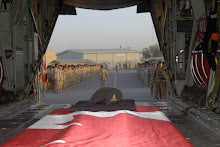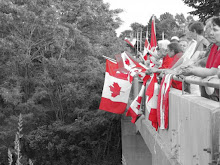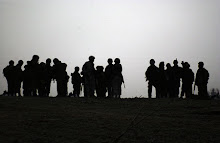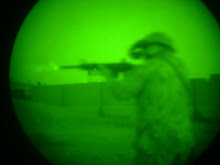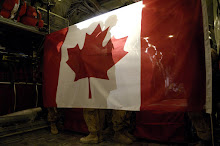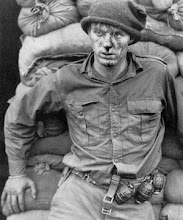"Okay, let's rock and roll."
The sergeant's command rallies the group of about 50 men who have just finished checking their weapons and equipment and are now donning helmets and goggles.
After days of blistering heat at a training location in the southern Interior of British Columbia, the soldiers from the Canadian Special Operations Regiment are ready to go.
"The hit will go as planned," says one soldier, referring to the raid on the bomb-making factory where other troops playing the role of terrorists are waiting.
The men all have several days' growth of facial hair and more than a few have bags under their eyes, an indication of the frenzied level of training they have been put through.
Soon the whine of the helicopter engines cranking up to full power can be heard and the air is filled with the smell of aviation fuel. The men move quickly single-file to the awaiting Griffon helicopters.
At the explosives factory their commanding officer, Lt.-Col. Jamie Hammond, will be waiting to watch the operation unfold.
The 44-year-old Victoria, B.C. native has been given the task of forming a new special forces regiment almost from scratch. The call went out for volunteers last December. And by Sept. 1 the unit, based in Petawawa, Ont., will be ready for initial operations.
"There are huge challenges every day, but I tell everyone to stop and look back where we came from," Hammond said in an interview after the training exercise. "You can see how much progress we've made over a short period of time."
Like other nations, Canada has taken the decision to boost the size of its special forces. Before the Sept. 11, 2001, attacks on the United States, the Canadian military had the Ottawa-based Joint Task Force 2, a 300-member unit, as its main force to deal with terrorists. Since then, JTF2 has been expanded and the military has created Canadian Special Operations Forces Command to oversee several units. By the end of the decade military officers estimate the command will be responsible for about 2,300 personnel.
Special forces are seen by many in the military as providing a highly skilled and flexible way to respond to the threat posed by terrorists and insurgents. They are viewed as being different from regular troops since they concentrate on high-value targets and missions, whether that involves destroying enemy headquarters, rescuing hostages or capturing war crimes suspects.
NATO has defined special operations as military activities conducted by specially trained and equipped troops using techniques not standard to regular forces on missions involving a "degree of physical and political risk not associated with conventional operations."
Hammond says his regiment, which has about 270 personnel but will increase over the next several years to 750, will not only support JTF2 but have capabilities of its own.
"I see us as complementing, but not replacing, anything that JTF2 does," he says. "If we have overlap between what we do and what JTF2 does, then that will allow them to focus on the harder stuff, more specific or precise work they've got to do."
The focus, said Hammond, will be on creating special operations soldiers, not more infantry.
In addition, the regiment will be the "public" face of Canada's growing special operations force. The top unit will still be JTF2 which operates under almost total secrecy.
The regiment will be more open, although officers are still working out the level of secrecy that is needed; a select group of reporters was allowed access to the unit on the condition that soldiers interviewed were identified only by their first names and photographs did not clearly show the faces of individual troops.
Hammond says the regiment will eventually be made up of three "direct action" companies and a special forces company. The direct action units will specialize in intelligence-gathering and raids on enemy targets, while the special forces company will be structured along the lines of the U.S. Green Berets.
The direct action companies would have a range of skills, including sniping, free-fall parachuting and the ability to call in air strikes. Hammond says the regiment would also like to develop capabilities to defeat improvised explosive devices - the homemade bombs that have become so common in Afghanistan.
The regiment will also be able to operate with U.S., British, Australian and New Zealand special forces.
It will use 12-person teams, each focusing on a specific region of the world. Hammond would like to have those soldiers versed in specific languages, such as Arabic, as well as different cultures.
"I think it's absolutely required in today's day and age," he explained.
"It's not necessary for special missions, but it could be used to support conventional operations. Having guys who understand the culture and the language is important."
Recruits with such skills could be found in Canada's large ethnic communities, he suggested.
"Major Will," the officer commanding 1 Direct Action Company, says the selection course for the regiment's recruits started earlier in the year with 178 candidates. That is now down to about 130 soldiers who are expected to form the company.
Over the last several months some people were injured, others dropped out after realizing the unit was not for them. "The 130 left are the ones willing to take that step into the unknown," says the 33-year-old officer, originally from Kingston, Ont.
The payoff, he says, will be the type of job that soldiers usually crave; a mix of high-level training as well as a multitude of operations. "When I joined the army 18 years ago this is what I wanted to do," he explained. "It will be high tempo for this crew. The guys here are dedicated."
Major Will noted that when it is in full operation, the direct action company will have a robust capability, able to operate on its own or with other units. Although the focus now is on preparing for direct action and special reconnaissance, the unit will eventually take on other roles.
Will expects that once the regiment is up and running, others in the military will be eager to join. "I think in a year or two, a lot of people are going to kick themselves for not coming out early," he says. "I think we'll get a flood of people."
Also at Canadian Forces Base Petawawa and supporting the regiment will be the 427 Special Operations Aviation Squadron.
Equipped with 17 Griffon helicopters, the squadron is learning a different set of skills needed to support special forces. The Kamloops area provides what is known as "high and hot" territory, semi-arid and mountainous terrain, somewhat akin to Afghanistan where the squadron and the regiment can eventually be expected to operate.
The squadron is cutting back on practising utility roles - such as carrying equipment on a sling beneath the helicopter - and focusing on more precise flying, getting special forces in and out of risky areas, and operating at night.
The aircrews are also honing basic soldiering skills, such as handling firearms, in case they are shot down over enemy territory and have to defend themselves.
Not everyone is convinced the Canadian Forces will be able to sustain the expansion in special operations. The Senate's committee on security and national defence is worried whether the 64,000-member military can provide enough skilled personnel and the funding for both JTF2 and the other units that fall under Canadian Special Operations Forces Command.
"We have concerns as to whether their structure and resources allotted will adequately support the very demanding roles that this extraordinary force will be expected to play," the committee noted in its report released in June.
It recommended that other units in the Canadian Forces provide soldiers to "jump start" the Canadian Special Operations Regiment. In addition, it also called on the navy to contribute specially-trained sailors so the unit can handle maritime roles.
At the same time, expanding the size of the Canadian Forces is needed, both to deal with the future missions of the military as well to provide the needed candidates for special forces, says committee chairperson Senator Colin Kenny.
SSS
Back at the training area outside Kamloops, the special forces troops are being helicoptered in to surround the compound where improvised explosive devices are being made. Inside, regular force soldiers are playing the roles of insurgents.
One Griffon helicopter lands a group of soldiers on a rooftop while other choppers touch down in a nearby field. Men rush toward the compound and there are bursts of gunfire and yelling. The insurgents are quickly overpowered and one prisoner is taken. "Badger coming out," yells one of the soldiers, a reference to the "terrorist" now in custody.
Another 30 minutes passes as the compound is searched for documents and other material that could provide intelligence on insurgent activities.
In the distance the Griffon helicopters wend their way back down the mountain valley, coming in so low they are barely visible until they land in a nearby field to pick up the troops. One of the training safety instructors watching the choppers remarks, "That's beautiful flying."
For some soldiers the special operations regiment will cap the final years of their career in the military. Glenn, a 42-year-old who is sergeant major for the direct action company, figures he has about six years left in the forces and is hoping to spend most of that time with the regiment.
"It's great to be part of something new," he explains. "If the regiment goes on to do great things then I know I was there at the beginning."
The Newfoundlander, who served in Afghanistan, acknowledges special operations is a young person's career, but says he spends about 12 hours a week in the gym to keep up his fitness level. As a sergeant major he notes he has to lead by example.
"The high-tempo of this unit appeals to me," Glenn explained. "As a soldier you always want to be the guy on the front line. This unit will certainly be that."
Ottawa Citizen
Canada's special forces in training, aim to be ready for action soon
KAMLOOPS, B.C. - Canada's new special forces regiment will be ready for action in several weeks as its first company of troops wind down their gruelling training schedule.
The special forces regiment will have its official "stand-up" ceremony at CFB Petawawa on Aug. 13.
At this point the regiment has about 270 members, including headquarters and supply staff, as well as a training cadre. It is expected to expand to 750 over the course of the next three to five years.
The regiment can be used for a variety of roles, including training foreign soldiers, special reconnaissance operations or direct action missions, military parlance for attacking enemy targets or individuals.
Since the regiment is at high readiness, it could also be called on to help Canadians trapped overseas reach safety, similar to the mission during the crisis in Lebanon.
PUBLICATION: Montreal Gazette
DATE: 2006.08.06
BYLINE: DAVID PUGLIESE








